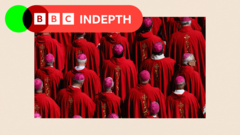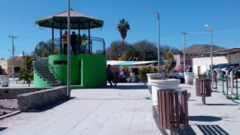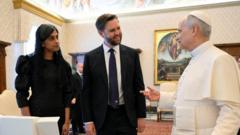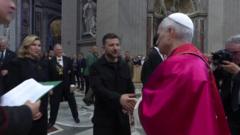In the lead-up to the papal conclave set for May 7, the traditionally serene atmosphere of the Vatican's Santa Marta guesthouse is overshadowed by a palpable tension among the cardinals. The inquiries about who will succeed Pope Francis, who passed away on Easter Monday, align with a backdrop of differing views on how to continue or transform his vision for the Church.
Behind the Vatican Walls: Divisions Emerge Ahead of the Papal Conclave

Behind the Vatican Walls: Divisions Emerge Ahead of the Papal Conclave
As the conclave approaches, cardinals navigate significant divides reflecting Pope Francis' impactful legacy.
Pope Francis’ tenure radically shifted the Church's focus towards engaging the faithful globally, particularly marginalized communities. His efforts to appoint diverse global leadership are reflected in the unprecedented representation of regions such as South Sudan and Papua New Guinea among the 133 voting cardinals. Recent consultations, attended by all 252 cardinals, have highlighted the varying priorities for the Church, particularly between regions like Europe, where revitalizing dwindling congregations is a pressing concern, and areas in Africa and Asia that grapple with poverty and conflict.
While many advocates of Pope Francis aim for continuity in addressing social issues, a faction of skeptics questions whether his approaches strayed too far from traditional Church doctrines. This division became apparent in pre-conclave discussions, where critiques of the former Pope’s governance and managerial priorities were voiced by both younger and elder cardinals.
The upcoming conclave is expected to yield significant implications not only for Catholics but also for global society, as Pope Francis managed to resonate with people outside the faith by championing universal issues such as the environment and the dignity of migrants. Cardinal Vincent Nichols articulated that the next Pope needs to embody a moral compass and a voice of acceptance.
While the expectations for clarity and unity surround the conclave, cardinals will ultimately rely on divine guidance as they step into the Sistine Chapel to elect the next Pope, a leader tasked with navigating the intricate dynamics of the modern Catholic Church amidst diverse global realities.
While many advocates of Pope Francis aim for continuity in addressing social issues, a faction of skeptics questions whether his approaches strayed too far from traditional Church doctrines. This division became apparent in pre-conclave discussions, where critiques of the former Pope’s governance and managerial priorities were voiced by both younger and elder cardinals.
The upcoming conclave is expected to yield significant implications not only for Catholics but also for global society, as Pope Francis managed to resonate with people outside the faith by championing universal issues such as the environment and the dignity of migrants. Cardinal Vincent Nichols articulated that the next Pope needs to embody a moral compass and a voice of acceptance.
While the expectations for clarity and unity surround the conclave, cardinals will ultimately rely on divine guidance as they step into the Sistine Chapel to elect the next Pope, a leader tasked with navigating the intricate dynamics of the modern Catholic Church amidst diverse global realities.




















